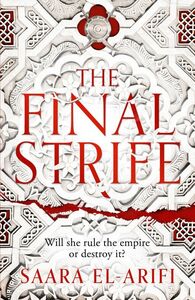Take a photo of a barcode or cover
The Final Strife was the first book I received as a part of my Goldsboro Science Fiction & Fantasy subscription and I’ve been meaning to get around to reading it for a while. The Final Strife is the first book in a planned trilogy of African and Arabian inspired fantasy, and this book includes themes of drug-addiction and colonialism with diverse representation including sapphic romance and trans and disability rep.
“Churned up from the shadows to tear it apart, a dancer's grace, a killer's instinct, an Ember's blood, a Duster's Heart.”
The Final Strife is set in a fantasy world where the red-blooded Embers rule harshly with their bloodwerk magic, while the blue-blooded Dusters and clear-blooded Ghostings serve. Every 10 years, the Aktibar takes place - a set of trials to determine which Embers will become the next Wardens of the Empire. The story is told from 3 POVs: Sylah - an Ember who was stolen and swapped as a child to be raised by Dusters as part of a revolution known as The Sandstorm, Hassa, a ghosting servant who moves unnoticed through the world, and Anoor - a blue-blood who was one of those given up by the Sandstorm to replace the daughter of the Warden of Strength and has since lived a life among the Embers where she has been told she doesn’t belong.
“You can’t fight it—you don’t want to—because alone you are just one grain. Together you are the desert.”
The story moves along at a reasonably fast pace, and offers some twists (although none were particularly surprising). Saara El-Arifi has crafted an interesting world and filled it with a diverse array of characters. I particularly enjoyed the characterisation of Anoor and Sylah. It initially took me a little while to become fully engaged in this book, however, once I was, I really rather enjoyed The Final Strife. This was a solid debut novel and I look forward to the next instalment in this series.
I loved the writing style, which reminded me a lot of Samantha Shannon, one of my fav authors.
I also loved that there was lots of world-building and plot that does not lean on popular tropes.
Critic points are that the most interesting things like the structures of the organizations like the Sandstorm were kept secret (the bonus chapter at the end about Loot was one of the most interesting ones and showed that El-Arifi can do it). I also felt like the points were there was action didn't quite hit as intended because they were too short and a little too predictable.
Last but not least I loved the queer-normative world. A perfect example of how it should be done.
RTC



